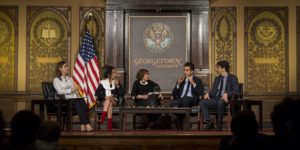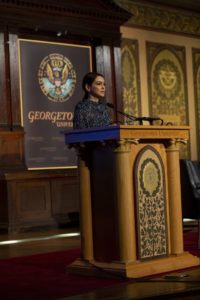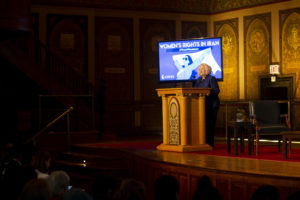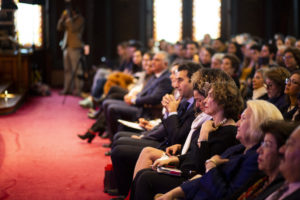
Title: GIWPS Hosts Conversation on Women’s Rights in Iran


Boniadi delivered remarks reflecting on the impacts of the 1979 Islamic Revolution, which brought with it many restrictions on Iranian women, including mandatory veiling, dress codes, and other constraints on their freedom. While Muslim women across the world may voluntarily choose to wear the hijab, for many Iranian women the mandatory hijab laws in their nation have come to be seen as a symbol of oppression.
“The plight of the Iranian woman runs far deeper than challenging compulsory clothing regulations,” Boniadi noted. “But for many women in Iran, the hijab has become a constant reminder of their inequality and oppression, and of social, political, and legal, and religious climate that favors men.”
She also urged the audience to be aware of the challenges faced by women across the world.
“We should open our eyes to the suffering of women and people beyond our borders and jurisdictions,” Boniadi said.
Rewriting History
Next, Ambassador Melanne Verveer, executive director of the Georgetown Institute for Women, Peace and Security moderated a panel discussion with Alinejad, and Nafisi.
Nafisi recalled the surreal experience she had returning to Iran and feeling like “home wasn’t home anymore.” She noted that in order to impose suppressive laws, regimes have to rewrite history, and pretend that things weren’t the way they were. In Iran, pushing for certain freedoms became labeled as being Western, even though these same freedoms existed in Iran prior to the 1979 revolution. “The first thing I realized was that in order for an autocratic regime to justify itself, it is going to confiscate the people’s history,” Nafisi said. “They reinvent and rewrite history.”
In the decades since the revolution, women from across Iran have pushed back against these imposed limitations, demanding their rights even despite great risks that come with doing so. In 2014, Alinejad launched My Stealthy Freedom, an online movement started from a Facebook page where Iranian women post pictures of themselves without headscarves. The page gained over a million likes and is still highly active. Alinejad also began the #WhiteWednesdays campaign in 2017, which encourages women to remove their hijabs in public or wear white shawls in a display of protest.
“I said to myself, ‘no, no, I’m not gonna wait for those people to overthrow the regime,’” Alinejad recalled. “Change only comes through the women, so we have to start our own revolution.”
Iranian Young People Want Choices in Their Lives
Sadjadpour and Molavi joined the panel, along with Brennan as the moderator. Sadjadpour noted that the younger generation today especially has expressed a desire for a better future. Many younger activists have used social media as a tool for spreading their message.
“I think the younger generation … is seeing that any system which treats women as second-class citizens … is never going to fulfill its enormous potential,” Sadjadpour said.
For young Iranians that Molavi has spoken with, the issue of the veil comes down to the question of choice. “These young people … wanted choices in their lives,” Molavi said. “If you choose to wear the hijab, you choose to wear the hijab, but it should not be mandated.”
In her closing remarks, GIWPS Executive Director Melanne Verveer noted that what is happening to women in Iran is not the end of the story. “Our program is coming to an end, the conversation surely doesn’t end, but neither does our own efforts in listening to the call for action,” Verveer said.

